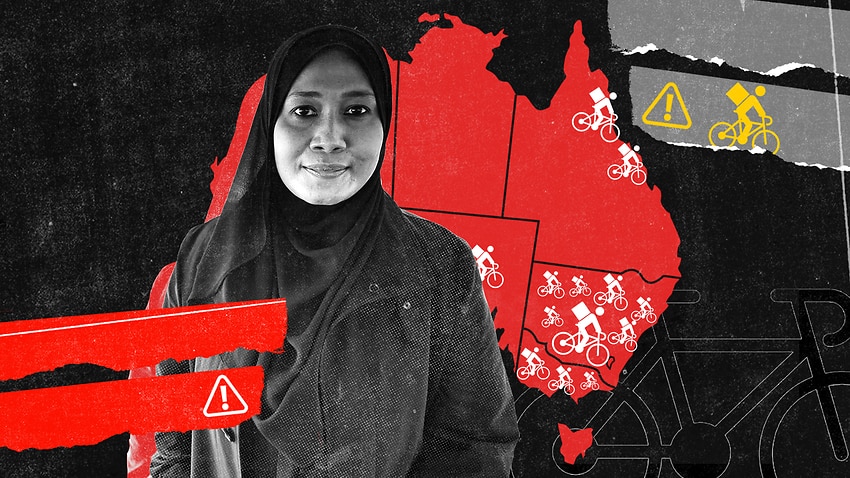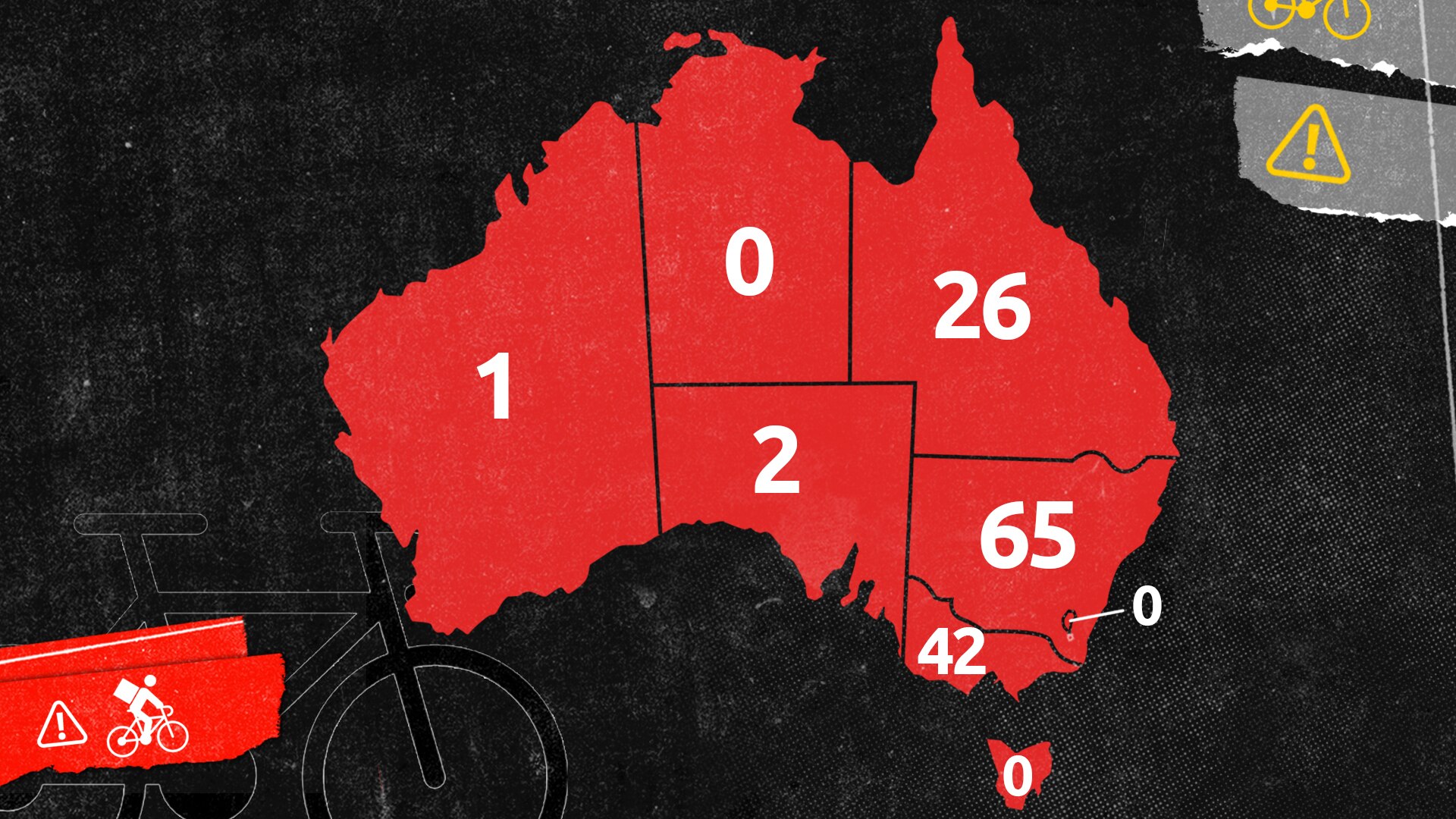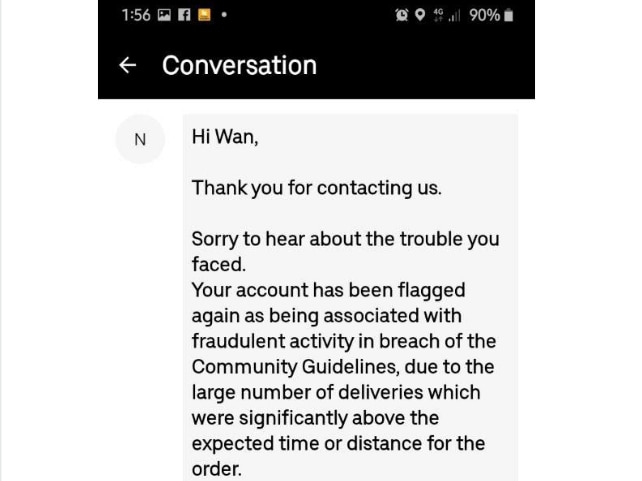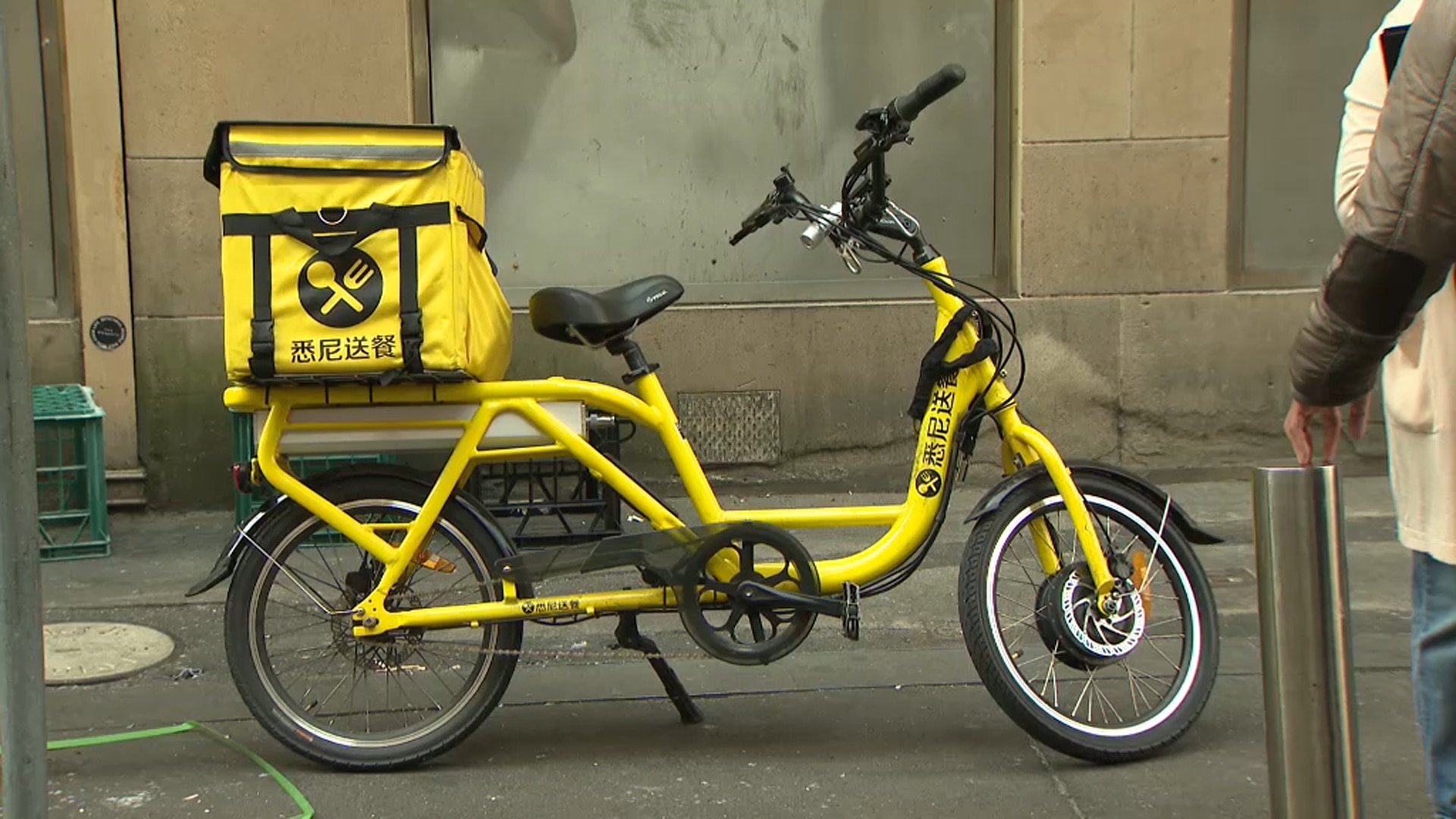Wan Rosaizam Ahmad, known to her friends and family as Rosya, understands just how dangerous working as a delivery rider can be.
The 41-year-old Malaysian national, who lives in Melbourne, recounts the moment she feared her life was over when her electric bicycle collided with the door of a parked car as it swung open into the bike path she was riding in.
“I was scared for my life, there was pain all over my body and I have suffered recurring headaches ever since,” she tells SBS News, speaking in Malay.
Rosya was delivering an Uber Eats order in Melbourne’s CBD in July when she was hit. She recalls people around her calling for an ambulance when she came to, but she did not want one. Instead, she called for her sister who took her to hospital where she was admitted overnight.
Medical records show she suffered a concussion and abrasions to her right elbow.
Rosya had joined the delivery platform fulltime in March after housecleaning work dried up during Melbourne’s coronavirus lockdown. After the accident, she contacted Uber Eats and said it took two days to get a response.
She was sent a claims form and paid out $2,400 after Uber’s insurance company Chubb assessed her injuries would temporarily disable her for 16 days.
But, she says, she could not return to work for more than two months because of her injuries and only returned as she had “no other choice”.
“I felt the compensation was not adequate, I was expecting more from the business,” she says.
I felt the compensation was not adequate, I was expecting more from the business.
– Rosya, Former Uber Eats rider
Rosya’s Uber Eats account was then permanently deactivated in November after what she says were three orders involving issues with delays and customer complaints. She says they occurred because she struggled to ride quickly as she was scared on the road.
“I don’t deny that there were some delays in the deliveries, but I feel there should have been some sympathy and leniency given I had just come out of an accident.”
Incidents around the country
Rosya is sharing her story as the lack of safety within Australia’s food delivery industry comes under intense scrutiny following a series of deaths of delivery workers.
New figures obtained by SBS News can also reveal New South Wales, Victoria and Queensland have recorded the most safety incidents involving food delivery riders this year.
As revealed last month by SBS News, workplace health and safety regulator SafeWork NSW has six ongoing investigations into online food delivery platforms after a total of 65 safety incidents were reported in the past 12 months. Victoria accepted 42 claims from “workers providing takeaway and other meal delivery services” in the past 12 months to 30 November 2020 and has no investigations currently ongoing.
There were 26 incidents notified to Workplace Health and Safety Queensland since the beginning of this year involving food delivery companies and no investigations are currently ongoing. Two of the incidents were investigated and no enforcement action taken.
WorkSafe Victoria and QLD noted their records do not differentiate between “delivery riders” of online food delivery platforms and other non-online businesses.
SafeWork SA said it has received two incident notifications in the past 12 months while WorkSafe WA has received one report of a safety incident involving an Uber Eats food delivery rider.
WorkSafe ACT and Tasmania said there has been no safety incidents involving online food delivery platforms in the past 12 months. NT WorkSafe said there has been no safety incidents involving Uber, Deliveroo and EASI in the same period.
But Nick McIntosh, assistant national secretary of the Transport Workers’ Union said the statistics significantly understate the extent of the safety issues impacting the gig economy.
“In just Sydney alone, our research has found that over half of delivery riders have been injured while they have been at work. Now those numbers are greater than what’s been reported to SafeWork around the country.
In just Sydney alone, our research has found that over half of delivery riders have been injured while they have been at work.
– Nick McIntosh, Transport Workers’ Union
“Many riders don’t report because they don’t know how to, or they know their claims will be rejected because of this loophole classification as independent contractors and not employees.
“Also, most of these regulatory systems mean that gig economy companies don’t even have to report these incidents because there’s a question mark as to whether they fall within the jurisdiction of the schemes.”
‘You simply get kicked off the app’
Mr McIntosh said Rosya’s experience of losing her job is all too common.
“It comes back to this issue that these riders have nowhere to go to challenge any of this, if the app or the algorithm spits out a complaint, whether it is justified or otherwise. You simply get kicked off the app.”
“I was very upset with the termination because it came with no proper notification or explanation,” Rosya says. “Uber is heartless. They have no compassion for us riders.”
In message exchanges seen by SBS News, Rosya attempted to find out from Uber Eats why her account had been deactivated but was met repeatedly with standardised messages such as “your account has been flagged as being associated with fraudulent activity in breach of the Community Guidelines, due to the large number of deliveries which were significantly above the expected time or distance for the order”, as well as “delayed deliveries make for a bad experience for both restaurants and consumers”.
Rosya denies she engaged in any kind of “fraudulent activity”.
SBS News sent a detailed email to Uber, the parent company of Uber Eats, setting out Rosya’s claims. It did not respond to any direct questions about her case. SBS News understands from previous communications with the platform that Uber does not comment on individual cases.
Instead Uber issued a statement which said: “Safety is fundamental to us and we have instituted a number of measures over recent years to keep those who use the platform safe, including onboarding modules covering road and bike safety, an annual cycling safety test and cycling-specific navigation”.
Any request received by a “delivery partner … includes pick up and drop off location, minimum earnings and the estimated time the delivery will take” and “there is no obligation to accept a delivery request, nor is there any consequence for not accepting a delivery request,” the response went on to say.
It also noted Uber is “constantly looking at ways to improve safety” and has an insurance partner support package “should something go wrong”. The company is committed to an industry response on safety standards, the statement said, and has in recent weeks begun conversations with other delivery businesses and the restaurant community.
Steps to improve safety
The NSW Government recently set up a task force to investigate the recent delivery rider deaths which is due to commence industry discussions next week in a bid to enhance safety. Four of the five deaths occurred in Sydney.
It will be led by SafeWork NSW and Transport for NSW and will examine whether any avoidable risks may have contributed to the deaths.
Food delivery platform Easi recently announced it would adopt longer delivery times in response and is encouraging other food delivery companies to do the same.
“We think the market is more understanding than we perhaps expect and so we are giving riders an extra 10 minutes,” the platform’s national operations manager Kitty Lu said.
For example, the Easi app will tell customers an order with an average delivery time of around 30 minutes will take between 20 to 40 minutes.
Legal challenges expected to rise
Jasmina Mackovic is the practice group leader for law firm Slater and Gordon’s workers’ compensation team. She is currently representing Lihong Wei, the widow of Hungry Panda delivery rider Xiaojun Chen who died after being hit by a bus in September.
She said legal challenges by delivery riders and their families are likely to rise in Australia.
Last month, the law firm lodged a claim for more than $830,000 in compensation on behalf of Mr Chen’s family in what could become a landmark challenge to Australia’s labour laws.
Hungry Panda is understood to have paid for Ms Wei’s travel to Australia from China, as well as the funeral expenses, but the company is not legally obligated to pay compensation to the family. The company did not respond to a request for comment from SBS News.
In Australia, most gig economy workers are classified as independent contractors, not employees. Independent contractors are not entitled to benefits such as minimum wages, superannuation, and workers compensation. While some delivery companies do offer a level of cover, there is no legal requirement for businesses to do so.
“This is a landmark test case, and we are looking to show that these workers are in fact employees of the respective companies they were delivering for,” Ms Mackovic said.
We are looking to show that these workers are in fact employees of the companies they were delivering for.
– Jasmina Mackovic, Slater and Gordon
Slater and Gordon has filed a claim with state insurer iCare and plans to take the matter to the NSW Workers’ Compensation Commission if the claim is rejected.
Last week, the Transport Workers Union also lodged a claim on behalf of the family of Indonesian-born Dede Fredy who was killed in a road accident in Sydney in September while working for Uber Eats. As with the case of Mr Chen, the union has plans to launch a test case at the Workers Compensation Commission if the claim is rejected by iCare.
Rosya says she hopes delivery services will improve their systems to support workers.
“My advice for people working in this industry is that you must just look after yourself because no one else cares,” she said.
“Do not expect much from the company you work for, they will not be there for you when you need it.”
Would you like to share your story with SBS News? Contact [email protected] or @LinEvlin on Twitter.











